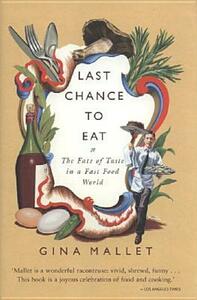Take a photo of a barcode or cover
slow-paced
There is some interesting material in here but it meanders, and not in a way that feels artful. There are also problems with the science. Some of this is unavoidable as the book was published in 2004 and there have been significant advances (particularly with mad cow). But Mallet seems to have little respect for scientists, seeing them mostly as an obstacle between her and her favourite foods. As a result, where she touches on food science, the book at best lacks nuance and at worst is actively misleading. In particular, for raw milk see: https://pmc.ncbi.nlm.nih.gov/articles/PMC4890836/
I almost DNF'd and frankly I probably should have.
I almost DNF'd and frankly I probably should have.
There was a promising premise for this book, but it was a cross between a memoir, a rant against food today, a recipe book, and a lament for taste and food lost. It could have used some tighter editing, in my opinion, and a little less of the author’s memories. Which seemed scattered much of the time.
Interesting and informative memoir shaped around the author's childhood memories of food. She argues that industrial food, for the most part, is devoid of taste and often not healthier than traditional foods, just more stable.
This book was interesting for a while, a little bit of a different spin as the author grew up in London. But after a while it became tedious, and it was due back to the library, so I let it go.
The best parts of this book were the mouth-watering recipes interspersed between the prose, and I've happily added several to my repertoire.
That having been said, I couldn't bring myself to read the entire thing: about two-thirds of the way through, I tossed the book aside. Mallet's pretension, crotchetiness and misty-eyed sentimentalism combined to turn me off whatever vague thesis she was chasing through her meandering memories and whimpered protests against modernity.
I'm no cheerleader for industrialized agriculture, but Mallet doesn't form a coherent critique of either the industry or the consumer capitalism which drives it.
That having been said, I couldn't bring myself to read the entire thing: about two-thirds of the way through, I tossed the book aside. Mallet's pretension, crotchetiness and misty-eyed sentimentalism combined to turn me off whatever vague thesis she was chasing through her meandering memories and whimpered protests against modernity.
I'm no cheerleader for industrialized agriculture, but Mallet doesn't form a coherent critique of either the industry or the consumer capitalism which drives it.
I loved this book.
This book is sort of a combination of Fast Food Nation and The Omnivores Dilemma in that it looks at what our food consumptions and production used to be and now is, but it also mixes in a wonderful personal account as the author looks at this from her personal experience growing up in pre-WWII England and her experiences there to moving to America and how things have changed over the years.
It not only looks again at the unhealthy and unsustainable practices we now employ in our food supply network, but it also looks at how our relationship with food and eating have changed and not necessarily for the better.
As food science has increased our factual knowledge and overall productivity, we seem to have lost much of the pleasure and more practical knowledge of food, food prep and eating itself. We have gotten so caught up on the numbers and fears that the way our food is now produced inspire in us that food has almost become our enemy vs. a source of nourishment and please that it is alright to enjoy and I fear this is something we will never truly regain.
For all that this was not a gloom and doom, look how horrible the food industry is book.
It was truly more a fond and happy look back with family, culture and food using the current changes as more of a back drop than as the main centerpiece.
This book is sort of a combination of Fast Food Nation and The Omnivores Dilemma in that it looks at what our food consumptions and production used to be and now is, but it also mixes in a wonderful personal account as the author looks at this from her personal experience growing up in pre-WWII England and her experiences there to moving to America and how things have changed over the years.
It not only looks again at the unhealthy and unsustainable practices we now employ in our food supply network, but it also looks at how our relationship with food and eating have changed and not necessarily for the better.
As food science has increased our factual knowledge and overall productivity, we seem to have lost much of the pleasure and more practical knowledge of food, food prep and eating itself. We have gotten so caught up on the numbers and fears that the way our food is now produced inspire in us that food has almost become our enemy vs. a source of nourishment and please that it is alright to enjoy and I fear this is something we will never truly regain.
For all that this was not a gloom and doom, look how horrible the food industry is book.
It was truly more a fond and happy look back with family, culture and food using the current changes as more of a back drop than as the main centerpiece.

